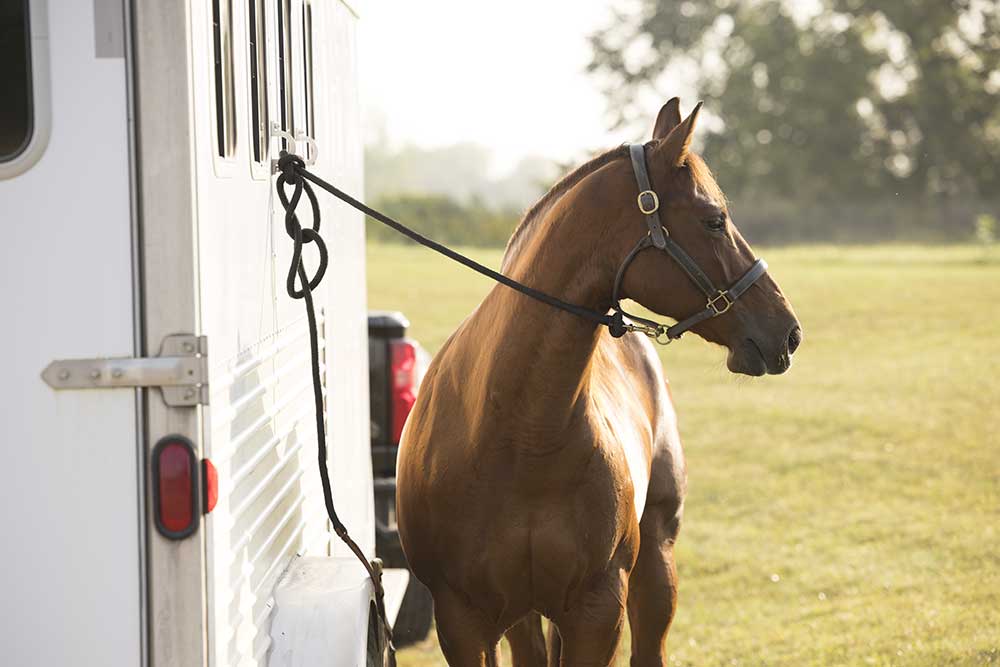
Identify causes of stress to help prevent equine gastric ulcer syndrome (EGUS)
Do you know what’s stressing your horse out? A recent survey found that an overwhelming majority of horse owners know that stress is one of the leading causes of ulcers, but only 33% can correctly identify all potential stressors when presented with a list of such.*
“Horses are prey animals, which means they naturally have a flight instinct,” says Sarah Reuss, VMD, DACVIM, Equine Technical Manager at Boehringer Ingelheim. “Many, many years ago, this was a useful survival skill, but nowadays, it can result in horses experiencing more frequent moments of stress.”
The survey found that common “big” stressors such as a change in routine, confinement in a stall and a change in a horse’s social environment are easily recognized by over 80% of horse owners. It’s the smaller, everyday moments of stress that are often overlooked.
“Many moments that may feel uneventful to a horse owner can actually feel big to their horses and, left unaddressed, can contribute to gastric discomfort,” says Reuss. “So many things that we think of as normal can actually be causing our horses stress.”
According to the survey, some of the commonly unidentified stressors are training, change in turnout and traveling.
Training
For many horse owners, riding and training is a part of daily life. However, any change in training routine can potentially cause additional stress to your horse.
“If a horse is injured and has to abruptly take a break from training or is being brought back into work after some time off, these are changes in their routine that can cause stress,” says Reuss. “This can be particularly challenging for horses that are new to a training program.”
The type, intensity and frequency of training can also have an impact on stress levels. Consider incorporating intentional rest days into your training regimen to help manage any stress associated with training.
Change in turnout
By nature, horses should spend time outside for both their mental and physical health. Whether a horse lives outside full-time or comes into a stall at night, turnout is a crucial part of their wellbeing.
“Many horse owners think that leisure horses or pasture pets don’t get stressed or develop ulcers, but that’s simply not true,” says Reuss. “Weather events that cause changes in their turnout routine, such as a storm that requires them to stay inside for several days or prohibits them from moving around in the pasture as much, can slow their gastric mobility and cause stress.”
If your horse must stay inside longer than normal, consider providing them with additional stimulation such as stall toys, hand walks or a slow feeder.
Traveling
Just like traveling can stress humans out, it can cause our equine companions stress as well. Any amount of time spent on the trailer, whether it’s to a horse show a few states away or just a casual trail ride, can increase a horse’s stress levels.
“Horse owners should make sure that their trailer is comfortable for their horse and that they’re driving the trailer safely,” says Reuss. “For longer trips, consider providing hay in the trailer and making multiple stops along the way to offer your horse water or take them for a hand walk, if safe to do so.”
Horse owners can also consider playing Relax Trax during stressful situations, which is a music track specifically designed to reduce stress in horses. Listen to Relax Trax below and learn more about the science behind the music.
While stress is unavoidable, being conscious of changes to your horse’s routine and being proactive in addressing any potential stressors can go a long way for your horse’s gastric health.
*Stressors included in the list presented in the survey were: Stall confinement, Change in social environment, Training, Traveling, Change in daily routine, Change in turnout, Moving to a new barn, New neighbor or pasture mate, and Change in weather, such as thunderstorms.
About Boehringer Ingelheim
Boehringer Ingelheim provides innovation for preventing and treating diseases in animals. The company offers a wide range of vaccines, parasite-control products, and medicines for pets, horses, and livestock to veterinarians, animal owners, farmers, and governments. As a leader in animal health, Boehringer Ingelheim values that the health of humans and animals is deeply connected and strives to make a difference for people, animals, and society. Learn more at www.bi-animalhealth.com.
This content originally appeared on Boehringer Ingelheim Animal Health and is published here with permission.
You can find more interesting stories in our section on Health & Education.

































